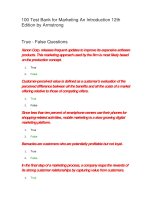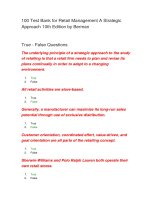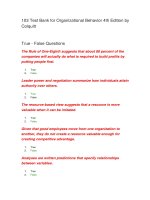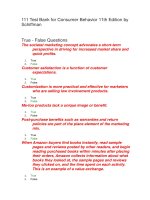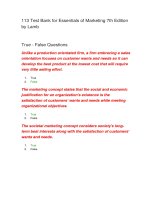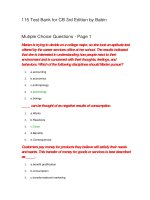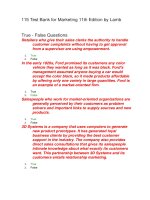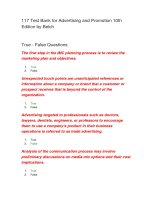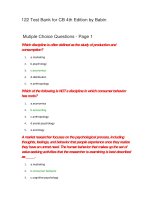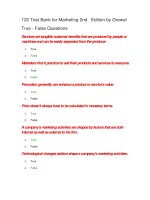144 test bank for fundamentals of selling customers for life through service 11th edition by futrell đề trắc nghiệm marketing
Bạn đang xem bản rút gọn của tài liệu. Xem và tải ngay bản đầy đủ của tài liệu tại đây (166.79 KB, 36 trang )
144 Test Bank for Fundamentals of Selling Customers
for Life through Service 11th Edition by Futrell
Multiple Choice Questions - Page 1
A person may choose a sales career because he/she desires:
1.
A. the limited variety of jobs available.
2.
B. rewards offered by a career in sales.
3.
C. the freedom of being self-employed.
4.
D. restricted opportunities for advancement.
5.
E. overt permission to procrastinate.
Hugh contacted his local phone company yesterday and talked to
someone about whether or not it is possible to have an internet
connection without having local phone service. The receptionist is likely
to have put him in touch with a(n):
1.
A. detail salesperson.
2.
B. retail salesperson.
3.
C. order-taker.
4.
D. account representative.
5.
E. sales engineer.
According to research by Gallup, the lowest-rated job category in terms of
perceived honesty and ethical standards is:
1.
A. lawyers.
2.
B. used car salespeople.
3.
C. real estate agents.
4.
D. order-takers.
5.
E. retail salespeople.
The _____ refers to the sales philosophy of unselfishly treating others as
you would like to be treated.
1.
A. Golden Rule of Personal Selling
2.
B. Reciprocity Principle
3.
C. 80/20 Principle of Relationships
4.
D. Osborne Principle of Sales Empathy
5.
E. Equity Theory of Sales
The person who telephoned Hugh last night to ask him if he was
interested in adding HBO and Cinemax to his current television cable
system would be classified as a(n):
1.
A. detail salesperson.
2.
B. retail salesperson.
3.
C. order-taker.
4.
D. account representative.
5.
E. sales engineer.
Insurance, gym memberships, and cruise vacations would be sold by:
1.
A. detail salespeople.
2.
B. account representatives.
3.
C. sales engineers.
4.
D. service salespeople.
5.
E. industrial products salespeople.
A career in sales management begins with the position of:
1.
A. assistant sales manager.
2.
B. district manager.
3.
C. entry-level salesperson.
4.
D. key account salesperson.
5.
E. assistant sales representative.
A salesperson who adheres to the Golden Rule of Personal Selling:
1.
A. is primarily motivated by money.
2.
B. is ego-driven.
3.
C. does what he/she is legally required to do.
4.
D. requires intensive monitoring.
5.
E. attributes his/her success to others.
Which of the following statements about selling is true?
1.
A. You are not involved in sales when you go to an interview with a potential
employer.
2.
B. Unlike other professions, journalists do not engage in selling activities.
3.
C. Everyone sells at their place of work, but not when at home with their families.
4.
5.
D. You are involved in selling when you ask someone to accompany you on a
shopping trip.
E. Only trained salespeople ever engage in selling activities.
In a large firm like Hewlett-Packard or General Electric, a salesperson's
career path usually begins at the level of:
1.
A. technical support person.
2.
B. sales representative.
3.
C. sales trainee.
4.
D. key account salesperson.
5.
E. assistant manager.
In addition to performance, the salary earned by a sales manager is
usually related to the:
1.
A. annual sales volume of the industry the firm is in.
2.
B. number of salespeople employed by competitors.
3.
C. individual's age.
4.
D. annual sales volume of his/her firm.
5.
E. number of years he/she spent in college.
Which of the following statements about order-getters is true?
1.
A. They wait for customers' orders.
2.
B. They often do not attempt to close sales.
3.
C. They do not need to use creative sales presentations.
4.
D. They are hired for additional business they bring.
5.
E. They often face the most powerful resistance.
Sales jobs are classified according to the type of products sold and:
1.
A. how the salesperson is compensated.
2.
B. quantity of sales by the salesperson.
3.
C. jobs performed by the salesperson.
4.
D. the salesperson's type of employer.
5.
E. territory size.
Andie sells drawer pulls, hinges, and other decorative metal pieces used
in the manufacture of furniture. Since the products she sells to the
furniture makers is nontechnical in nature, Andie would be described as
a(n):
1.
A. account representative.
2.
B. detail salesperson.
3.
C. sales engineer.
4.
D. order-taker.
5.
E. industrial products salesperson.
Which of the following is NOT a type of manufacturer's sales
representative?
1.
A. Detail salesperson
2.
B. Account representative
3.
C. Sales engineer
4.
D. Direct salesperson
5.
E. Industrial products salesperson
Which is the logical order of salespeople based upon decreased selfinterest?
1.
A. Golden Rule, traditional, professional
2.
B. traditional, Golden Rule, professional
3.
C. professional, traditional, Golden Rule
4.
D. Golden Rule, professional, traditional
5.
E. traditional, professional, Golden Rule
As a salesperson for a plumbing supply wholesaler, Titus is unlikely to
sell products to:
1.
A. a family through door-to-door selling.
2.
B. the United States government.
3.
C. a small company that manufactures lawn furniture out of PVC pipes.
4.
D. a plumbing contractor who is working on a new motel.
5.
E. a hospital maintenance department.
Identify the correct statement about the importance of salespeople and
selling.
1.
A. Salespeople are responsible for the success of new products, but have little to
do with keeping existing products in the marketplace.
2.
B. Only the medical profession generates more revenue in our economy than the
selling profession.
3.
C. Salespeople have a direct impact on the opening of new businesses and
whether those businesses are successful.
4.
D. Only the legal profession generates more revenue in our economy than the
selling profession.
5.
E. Salespeople are responsible for keeping existing products in the marketplace,
but have little to do with the success of new products.
Bronson is thinking about a career in personal selling. His friends have
told him that is a good direction because he reminds them of salesmen
that they have met. Which of the following qualities that they listed to him
should cause concern about how truly "good" he would be as a
salesperson?
1.
A. He communicates well with people.
2.
B. He is good at working on his own.
3.
C. He is good at making people buy something even when they do not want it.
4.
D. He loves a challenge.
5.
E. He is also good at management and selling might yield advancement in the
company.
Bo Hampton is a(n) _____ for a manufacturer of restaurant-grade
appliances. He does not directly solicit orders. His primary duties involve
promotional activities such as introducing and demonstrating new
products at trade shows.
1.
A. retail salesperson
2.
B. detail salesperson
3.
C. sales engineer
4.
D. service salesperson
5.
E. account representative
Another name for a salesperson is a(n):
1.
A. transaction manager.
2.
B. exchange coordinator.
3.
C. countertrader.
4.
D. stakeholder supervisor.
5.
E. customer contact person.
According to the text, a new and more appropriate definition of personal
selling:
1.
A. relates it more closely to transactional marketing.
2.
B. excludes e-selling.
3.
C. includes the word "unselfish."
4.
D. excludes telemarketing activities.
5.
E. substitutes the words "relationship marketing" for "personal selling."
A newer definition of _____ defines it as the personal communication of
information to unselfishly persuade a prospective customer to buy
something that satisfies that individual's needs.
1.
A. integrated marketing communications
2.
B. dyadic communications
3.
C. personal selling
4.
D. transactional marketing
5.
E. relationship marketing
Order-takers:
1.
A. use creative sales strategies.
2.
B. have an infinitely more difficult selling situation than order-getters.
3.
C. usually earn much more than order-getters.
4.
D. rely on well-executed sales presentations.
5.
E. are hired to bring in additional business.
The person behind the counter at Subway who enters your order, takes
your money, and hands you your food is a(n):
1.
A. retail salesperson.
2.
B. sales engineer.
3.
C. order-getter.
4.
D. service salesperson.
5.
E. account representative.
Debby sells Pampered Chef kitchen products directly to the people who
will use the products themselves. These sales that she makes face-to-face
are examples of:
1.
A. retail selling.
2.
B. wholesale selling.
3.
C. account representation.
4.
D. detail selling.
5.
E. sales engineering.
_____ is traditionally defined as the personal communication of
information to persuade a prospective customer to buy something which
satisfies that individual's needs.
1.
A. Marketing
2.
B. Personal selling
3.
C. Public relations
4.
D. Advertising
5.
E. Promotion
In which of the following industries are you most likely to find a sales
engineer being used?
1.
A. Apparel
2.
B. Heavy equipment
3.
C. Home healthcare
4.
D. Pet supplies
5.
E. Book
According to the Golden Rule of Personal Selling, an effective
salesperson has all of the following characteristics EXCEPT:
1.
A. he/she has the Midas touch.
2.
B. he/she owes greater allegiance to his/her employer than to customers.
3.
C. he/she unselfishly treats others as they would like to be treated.
4.
5.
D. he/she can use manipulation/coercion if making the sale will benefit his/her
company.
E. he/she creates customer loyalty through discipline, persistence, and optimism.
Yevi Zoltan sells blank aluminum cans for soda manufacturers to fill.
Zoltan would be classified as a(n):
1.
A. detail salesperson.
2.
B. account representative.
3.
C. sales engineer.
4.
D. direct salesperson.
5.
E. industrial products salesperson.
Which of the following statements about the importance of salespeople
and selling is true?
1.
A. Salespeople have only indirect impact on the success of new products.
2.
B. White collar professionals generate more revenue in our economy than selling
professionals.
3.
C. The orders produced by salespeople are largely responsible for the operation of
the nation's distribution system.
4.
D. Salespeople have almost no impact on the construction of manufacturing
facilities.
5.
E. Retailers do not rely on supplier salespeople to keep existing products on their
shelves.
According to the author's research online:
1.
A. sales students believe that the general public has a reasonably positive attitude
about salespeople in general.
2.
B. sales students believe that salespeople are more often trustworthy than not.
3.
C. only 9% of sales students believed that salespeople have low ethical standards.
4.
D. only 44% of sales students would accept a job in sales if offered one.
5.
E. sales students think that sales people are less readily accepted today than 50
years ago.
Salespeople who are _____ obtain new and repeat business using a
creative sales strategy and a well-executed sales presentation.
1.
A. order-collectors
2.
B. order-takers
3.
C. order-hunters
4.
D. order-service providers
5.
E. order-getters
All of the following are reasons why a person may choose a sales career
EXCEPT:
1.
A. the limited variety of jobs available.
2.
B. rewards offered by a career in sales.
3.
C. the challenge of selling.
4.
D. opportunities for advancement.
5.
E. the freedom to be on one's own.
69 Free Test Bank for Fundamentals of Selling
Customers for Life through Service 11th Edition by
Futrell Multiple Choice Questions - Page 2
_____ skill is the understanding of and proficiency in the performance of
specific tasks.
1.
A. Human
2.
B. Communication
3.
C. Conceptual
4.
D. Technical
5.
E. Planning
Which of the following statements about sales success is true?
1.
A. For success in sales, it is more important to speak well than to listen well.
2.
B. Today's salespeople make contributions to the welfare of others through
service.
3.
C. A successful salesperson does not need to think strategically because that is
the job of the sales manager.
4.
D. Successful salespeople often can avoid providing service to customers if they
present a "nice guy" image.
5.
E. Stamina is not necessary for sales success.
As a modern, professional saleswoman, Hera Llewellyn does not want her
prospects and clients to perceive her as a(n):
1.
A. partner.
2.
B. counselor.
3.
C. problem-solver.
4.
D. adversary.
5.
E. consultant.
The sales force of the 21st century as compared to the sales force of
earlier years will:
1.
A. be less well-trained.
2.
B. contain a higher percentage of Caucasians.
3.
C. contain more nonwhite males.
4.
D. be less productive.
5.
E. include a lower number of workers.
The "heart" of the eight work characteristics for sales success is:
1.
A. sales knowledge.
2.
B. commitment to service.
3.
C. communication ability.
4.
D. love of selling.
5.
E. stamina for the job.
The skills a salesperson needs to perform his/her job can be categorized
into three areas. According to the text, which of the following is an
example of a conceptual skill?
1.
A. Ability to solve technical problems
2.
B. Strategic thinking
3.
C. Ability to use selling tools
4.
D. Being pushy
5.
E. Working through other people
The text suggests several questions you should ask yourself as you
decide whether a career in sales is appropriate for you. Which one of the
following is NOT one of those questions?
1.
A. How much freedom do I want in the job?
2.
B. How much travel am I willing to do?
3.
C. Am I willing to transfer to another state?
4.
D. Do I want to pursue my hobbies?
5.
E. What are my future goals?
Which of the following is not a "fruit of the selling spirit?"
1.
A. Goodness
2.
B. Gentleness
3.
C. Kindness
4.
D. Faithfulness
5.
E. Aggressiveness
According to the text, some of the changes that will impact salespeople in
the 21st century include all of the following EXCEPT:
1.
A. ethics.
2.
B. diverse customers.
3.
C. global selling.
4.
D. the need to create customer partnerships.
5.
E. the need for local sales experience.
Sales jobs differ from other jobs because sales jobs require:
1.
A. no computer skills.
2.
B. limited human skills.
3.
C. more physical stamina and mental toughness than most other types of jobs.
4.
D. a sense of reciprocity.
5.
E. close supervisory control.
_____ skill is the seller's ability to work with and through other people.
1.
A. Human
2.
B. Relational
3.
C. Conceptual
4.
D. Technical
5.
E. Adversarial
When Derrick performs the functions of planning, organizing, and
executing activities that increase sales and profits in his district, he is
performing the duties associated with:
1.
A. operating management.
2.
B. sales management.
3.
C. marketing.
4.
D. territory management.
5.
E. time management.
_____ skill is the cognitive ability to see the selling process as a whole
and the relationship among its parts.
1.
A. Human
2.
B. Adversarial
3.
C. Conceptual
4.
D. Technical
5.
E. Manipulation
The final step in the selling process is:
1.
A. the presentation.
2.
B. to meet objections.
3.
C. the close.
4.
D. follow-up and service.
5.
E. the approach.
The skills a salesperson needs to perform his/her job can be categorized
into three areas. According to the text, which of the following is an
example of a technical skill?
1.
A. Analytical ability
2.
B. Strategic thinking
3.
C. Knowing where his/her product fits into the customer's business
4.
D. Planning ability
5.
E. Working through other people
In terms of the selling process, what is Brooke's next step once she has
satisfactorily answered an objection voiced by her prospect?
1.
A. Prospecting
2.
B. Approach
3.
C. Presentation
4.
D. Trial close
5.
E. Close
The text suggests several questions you should ask yourself as you
decide whether a career in sales is appropriate for you. Which one of the
following is NOT one of the questions that you should ask before
beginning a career in sales?
1.
A. How much freedom do I want in the job?
2.
B. Do I have the personality characteristics for the job?
3.
C. Am I willing to transfer to another city?
4.
D. What are my past accomplishments?
5.
E. How much money do I want to earn?
Which is not a "fruit of the selling spirit?"
1.
A. Joy
2.
B. Peace
3.
C. Financial success
4.
D. Love
5.
E. Patience
Effective territory management involves all of the following EXCEPT:
1.
2.
A. creating new customers.
B. planning and executing activities that increase sales and profits in a given
territory.
3.
C. providing solutions to customers' problems.
4.
D. providing his/her company with market information.
5.
E. waiting for customers to ask for the new sales order.
The acronym SSUCCESS is used in selling to help you remember the
eight:
1.
A. most frequently listed skills needed to be successful in sales.
2.
B. steps required to create a customer profile.
3.
C. mental stages through which customers pass as they decide to buy.
4.
D. types of knowledge a salesperson needs to succeed.
5.
E. steps to creating the sales presentation.
Which of the following statements about a salesperson's duties as a
territory manager is true?
1.
A. The success of a salesperson is based entirely on his/her product knowledge.
2.
B. Salespeople provide solutions to customers' problems.
3.
C. Salespeople are not expected to become involved with damaged goods.
4.
D. A salesperson producing a sufficient number of new accounts each period is
not expected to increase sales in his/her existing accounts.
5.
E. Once a product is sold to a customer, the salesperson has no further
responsibility to the customer.
The three categories of skills needed by the successful salesperson can
be summarized as:
1.
A. conceptual, human, and technical skills.
2.
B. personal, mental, and spiritual skills.
3.
C. communication, relationship-building, and empathy skills.
4.
D. sales features, advantages, and benefits.
5.
E. order-getting, order-taking, and service-providing skills.
During the _____ step of the selling process, salespeople would locate
potential buyers.
1.
A. prospecting
2.
B. preapproach
3.
C. trial close
4.
D. meeting objections
5.
E. follow-up and service
Grant Kui is a new salesperson. As such, he has asked you to tell him
which of the following he would be expected to do as a part of providing
service to his customers. Identify the correct answer.
1.
A. Develop new products
2.
B. Work with new customers only
3.
C. Not involve himself in after-sale technical problems
4.
D. Create technical research analyses reports
5.
E. Work at the customer's business when required
According to the text, which of the following is NOT identified as one of
the eight work characteristics needed for sales success?
1.
A. Sales knowledge
2.
B. E-management skills
3.
C. Communication skills
4.
D. Love of the job
5.
E. Stamina for the job
Usually, the first sales management position to which a salesperson is
promoted is:
1.
A. senior salesperson.
2.
B. key sales manager.
3.
C. regional sales manager.
4.
D. divisional sales manager.
5.
E. district sales manager.
All of the following characteristics are ways in which salespeople satisfy
their need to achieve EXCEPT:
1.
A. a caring attitude.
2.
B. patience.
3.
C. emotional self-control.
4.
D. a dissatisfaction with nonfinancial rewards.
5.
E. a strong sense of what is ethical.
Which of the following is NOT one of the main elements in the customer
relationship process?
1.
A. Provide excellent service
2.
B. Analyze customer needs
3.
C. Provide marketing information
4.
D. Gain commitment for the purchase
5.
E. Present product benefits
Effective territory management:
1.
2.
A. requires a salesperson to continually engage in new product development.
B. does not require a salesperson to maintain relationship with the existing
customers.
3.
C. means the salesperson does not perform nonselling activities.
4.
D. means the salesperson provides his/her company with market information.
5.
E. does not involve teaching customers how to use the purchase.
_____ skills refer to the seller's understanding and proficiency in the
performance of specific tasks.
1.
A. Conceptual
2.
B. E-selling
3.
C. Automated
4.
D. Nonhuman
5.
E. Technical
Newton is in the _____ step of the selling process when he asks a
prospect for her opinion about the product he is selling.
1.
A. prospecting
2.
B. meeting objections
3.
C. trial close
4.
D. follow-up and service
5.
E. preapproach
The skills a salesperson needs to perform his/her job can be categorized
into three areas. According to the text, which of the following is an
example of a human skill?
1.
A. Analytical ability
2.
B. Strategic thinking
3.
C. Knowing where his/her product fits into the customer's business
4.
D. Sound technical knowledge
5.
E. Working through other people
All of the following are related to the nonfinancial rewards that you as a
salesperson receive EXCEPT:
1.
A. encountering new challenges.
2.
B. intrinsic rewards.
3.
C. customer entertainment allowances.
4.
D. a feeling of self-worth.
5.
E. a reward generated by you, not given by the company.
The four main elements in the customer relationship process used by
salespeople to build long-term relationships are excellent service, a
presentation of product benefits, a willingness to constantly analyze
customer needs, and:
1.
A. optimism.
2.
B. the ability to relate benefits to features.
3.
C. persistence.
4.
D. the ability to accept rejection.
5.
E. gain commitment for the purchase.
All of the following are required for a salesperson to be knowledgeable
EXCEPT:
1.
A. must have product knowledge.
2.
B. must be aware of global selling.
3.
C. must be aware of the diversity of salespeople and customers.
4.
D. must understand customer partnerships.
5.
E. must have the drive to make the job the main priority.
True - False Questions
Retail salespeople must maintain contacts at all levels of the client
organization.
1.
True
2.
False
The key to customer retention is customer satisfaction.
1.
True
2.
False
Even experienced sales representatives in outside sales typically receive
intensive direct supervision.
1.
True
2.
False
People tend to generalize that most salespeople are not honest or ethical.
1.
True
2.
False
A salesperson's career path is an upward sequence of job movement.
1.
True
2.
False
It is inappropriate for a good salesperson to provide information to his/her
company on such topics as competitors' activities and marketing
opportunities since doing so would exceed his/her authority and violate
customer confidences.
1.
True
2.
False
To be a successful salesperson, a salesperson must love to sell.
1.
True
2.
False
While salespeople typically provide many services for their customers,
returning damaged merchandise is not one of them.
1.
True
2.
False
Salespeople are advisors who manipulate people for personal gains.
1.
True
2.
False
A person is involved in selling when he/she wants someone to do
something.
1.
True
2.
False
The last step in the sales process is the close.
1.
True
2.
False
Successful salespeople often can avoid providing service to customers if
they present a "nice guy" image.
1.
True
2.
False
A sales engineer and a detail salesperson perform basically the same
tasks.
1.
True
2.
False
Technical skill is the understanding of and proficiency in the performance
of specific tasks.
1.
True
2.
False
Nonfinancial rewards are given by the company as incentives.
1.
True
2.
False
Personal selling refers to the personal communication of information to
unselfishly persuade a prospective customer to buy something that
satisfies that individual's needs.
1.
True
2.
False
A detail salesperson concentrates on directly soliciting orders.
1.
True
2.
False
Often the biggest challenge to success in selling is not out there in sales
territory but is within the person.
1.
True
2.
False
The sales process refers to the checklist salespeople use to prepare
themselves for dealing with prospects' objections.
1.
True
2.
False
Part of learning how to become an effective salesperson includes
adopting one's own physical exercise program.
1.
True
2.
False
A retail salesperson sells goods or services to companies to satisfy their
business needs.
1.
True
2.
False
Self-control is the most difficult trait for a salesperson to develop.
1.
True
2.
False
The sales person is engaged in a highly honorable, challenging,
rewarding, and professional career.
1.
True
2.
False
Customer contact person is another name for a salesperson.
1.
True
2.
False
Direct sellers are also called distributors.
1.
True
2.
False
The practice of the Golden Rule of Personal Selling extends to customers,
but not to competitors.
1.
True
